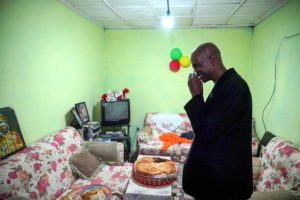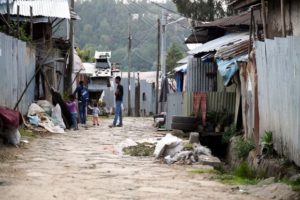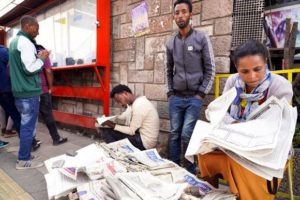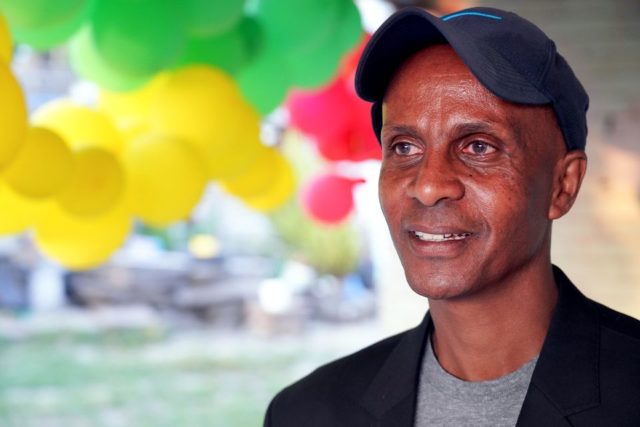This time in prison Ethiopian journalist Eskinder Nega was no longer tortured, thanks in part to increased international pressure and public awareness.
“Are you here to meet Eskinder Nega?” a man selling fries on the streets of Addis Ababa asks me. After answering in the affirmative, I am assured by the others standing nearby: “Eskinder is a good man”.
It’s clear that Eskinder’s fellow citizens have not forgotten their freedom-fighter hero, despite the fact that he hasn’t been seen in public for years.
A car pulls up alongside us and in the next instant the famed Ethiopian journalist and blogger Eskinder Nega is there, smiling broadly in his ever-present baseball cap.
He is a free man again after seven long years in jail. He still hasn’t reunited with his wife and child, however, as they have left Ethiopia for the US.
We enter a walled courtyard through an iron gate, where Eskinder and his relatives live in modest homes.
His porch is decorated with green, yellow and red balloons, the colours of the Ethiopian flag. They were purchased to celebrate Eskinder’s release from prison just three weeks earlier.
“I am not a hero, I have only done my duty,” Eskinder has said about his life’s work.

Happy to be back in his home, Eskinder Nega blesses his meal of bread
Eskinder Nega became a defender of free speech after writing a series of articles demanding democracy in his home country. He was later forced to pay a hard price for this conviction.
But when we met, there was no trace of bitterness in him. He was excitedly planning for the future.
Neither of us could have foreseen that he would be back behind bars all too soon.
Close to seven years ago, Eskinder wrote about the Arab Spring demonstrations and the possibility that Ethiopia’s population might also rise up in protest. The next morning, as he was accompanying his boy to school, he was arrested.
“[My son] cried violently. He was five years old when this happened,” Eskinder says.
It was almost seven years until he spoke with his boy again over the phone.
His child has suffered many times in his short life, just as his parents have done. Eskinder’s wife and fellow journalist, Serkalem Fasil, gave birth to their son while she was imprisoned herself, in 2005.
Eskinder says there are many people who can’t understand how something of this nature could even be possible.
“This is Africa. If you’re a dissident like I was, like I am, you’re accused of being a terrorist,” he says.

Eskinder Nega lives in a poor northern district of Addis Ababa. Image: Mika Mäkeläinen / Yle
In 2012 he was sentenced to 18 years in prison for allegedly being a part of the so-called Ginbot 7, an association the Ethiopian government has classified as a terrorist group. Eskinder says they had no proof of this.
Ginbot 7 is a group of opposition activists that live in exile. They jointly demand that Ethiopia starts practicing democracy in the true sense of the word via peaceful means.
“I’m still firmly committed to non-violence. I still believe in non-violence without any preconditions. And I think it’s the way for Ethiopia, irrespective of the price or sacrifice it entails,” Eskinder says.
He explains what he feels actually led to his incarceration.
“It was not the truth that mattered. It was what the government wanted that mattered. And the government wanted to convict me of terrorism at that point,” he says.
Shortly before he was released in February, the authorities tried to get Eskinder to confess that he was a member of the Ginbot 7. He refused, and was sent back to his cell. One week later, Nega was set free, along with hundreds of other prisoners of consciousness in Ethiopia.
When it comes to human rights and freedom of speech, Ethiopia is regularly ranked among the worst countries in the world. Authorities rely on an ongoing state of emergency to violently crack down on public demonstrations and online activities.
Eskinder says that freedom of expression in his home country is “non-existent”. The latest Reporters Without Borders listing ranks Ethiopia at 150 out of 180 countries in total, stating that “terrorism charges have been systematically used against journalists ever since the 2009 terrorism law took effect.”
The over 100 million people of Ethiopia are ruled by the Ethiopian People’s Revolutionary Democratic Front, or the EPRDF. As the name suggests, the party began as a rebel movement that successfully ousted the previous military regime. It has ruled the country since 1991.
EPRDF is a union of four supposedly separate parties that represent different ethnic groups. Between them, they hold all of the seats in the country’s parliament. Any real opposition that exists operates outside this closed realm of decision-making.
For years the EPRDF was led by Hailemariam Desalegn, a man who studied at Finland’s Tampere University of Technology in his youth. This February, amid the growing unrest, he submitted his resignation as both prime minister and chairman of the country’s ruling coalition.
Yet despite the political violence that has gone on for years in Ethiopia, it is still a relatively stable nation compared to its neighbouring countries of war-torn South Sudan and Somalia.
Ethiopia is one of the western countries’ favourites in the Horn of Africa for this reason. It receives one-third of its total income as development aid from rich nations in the west.
Ethiopia has imprisoned thousands of political dissidents over the last few years. At the start of 2018, however, a significant number were released, with Eskinder Nega perhaps the most prominent name among them.
Eskinder Nega believes that international pressure and more publicity for his country’s predicament was instrumental in securing the political prisoners’ release. But he also credits the Ethiopian people.
“The people demanded our release. People died to get us released. The EPRDF didn’t let us go willingly. It was not a change of heart on their part. It was public pressure,” he says.
He thanks foreign organisations that work tirelessly to defend freedom of speech for keeping his imprisonment in the public eye. He is also quite certain that this international attention affected how he was treated in jail.
He was not tortured this time around, unlike during his previous detentions.
This last arrest marked the eighth time that Eskinder Nega had served time in prison.
“I was slapped, kicked and verbally abused. I have experienced the worst things that could happen to you in Africa,” he says.
Even so, there were things about his latest sentence that he still found unbearable.

The people of Ethiopia hope freedom of speech will improve under their new prime minister. Image: Mika Mäkeläinen / Yle
“By the end, I was denied access to paper, I was denied access to pen, I was not allowed to write and read. I was denied access to books. But the worst part was the denial of a Bible,” Eskinder says.
During his earlier prison stays, Eskinder read the Bible to pass the time. He says that reading the Holy Book was a tremendous source of strength for him during his earlier imprisonments.
Eskinder Nega’s optimism is disarming. Just weeks after ending seven years behind bars, he has moved his focus beyond the injustices he has suffered. He sees a democratic Ethiopia on the horizon.
He holds South Africa as his ideal. He says there are two reasons for this. First, the African National Congress (ANC) ultimately reached its goal of democracy through negotiation and not fighting. Second, a decisive boost was given to the effort by international pressure and sanctions.
“So we have that precedence. We have that example to follow. I think the same thing will work in Ethiopia because the government is highly dependent on aid and its external economic relations,” Eskinder says.
He says the conclusions that can be drawn from this are crystal clear: Finland and the other Nordics must end their development aid to Ethiopia and start directing it only to countries that operate under true and fair representational democracies.
“As far as Scandinavian countries go, I think human rights should play a prominent role in how you conduct your foreign policy,” he says. “I think good behaviour should be rewarded and bad behaviour should be punished. This is elementary, not only in politics and in foreign policy, but in life.”

Ethiopia’s population grows by 2.5 million every year. Image: Mika Mäkeläinen / Yle
Ethiopia’s leading dissident says Finland and the other western countries are propping up tyranny in Ethiopia by continuing to provide aid and investment. Eskinder has suggested that sanctions have buttressed peaceful transitions to democracies in other countries, such as South Africa, Zimbabwe and Myanmar.
“Through sanctions we can force the government to negotiate for a peaceful transition. This is what the nation needs,” Eskinder says.
Eskinder Nega says that western countries should start taking an interest in the democratization of Ethiopia, if only for their own self-interest. He warns that if negotiations are unable to transform the country into a democratic state, the pressure will build until Ethiopia implodes. This could lead to another wave of migration from northern Africa to Europe.
Finland’s Minister for Foreign Trade and Development Anne-Mari Virolainen visited Ethiopia in March. She doesn’t agree with Nega’s appraisal of the situation. She denies that development aid from Finland would ever be used to legitimize Ethiopia’s dictatorial rule.
“Someone could choose to see it that way, but I certainly don’t. I think it is important that we maintain continuous dialogue with these people,” Virolainen says.
Finland upholds the principles of human rights and rule of law in Ethiopia as well, she counters.
“We’ve brought up these same questions in all of our dealings. It is the only way to do it, really. To broach the subject directly,” she says.
And how have Ethiopia’s rulers responded? Virolainen says they have outlined their own political processes in their retorts.

Many opposition newspapers have been shut down in Ethiopia Image: Mika Mäkeläinen / Yle
Ethiopia’s leading dissident Eskinder says the dialogue western countries have been practicing all these years has been proved many times over to lead to dead ends.
“The West has done this for 27 years, and what has changed? Nothing. We still have an authoritarian government,” he says.
Evening has arrived and I say good-bye to Eskinder Nega. He walks inside for something to eat, says a prayer over his bread, and then shares it with his friends. There are so many people to talk to; so much time has been lost.
Upon my return to Finland, I hear that Eskinder has been arrested again. He sent a message from his captivity that says that this time, he was one of 200 prisoners crowded into a 40 square-metre room. He was in prison for two weeks. I called him once he was released.
“The conditions of my detainment were absolutely inhumane. We had no room in which to eat or sleep. It was as difficult as you could possibly imagine,” he tells me over the line.
He is a free man once again, but he now awaits word of possible charges levied against him. He says he has no idea what he could be accused of or when he will be required to stand trial. There’s also a chance that the whole case will be dropped.
The future of Eskinder Nega’s freedoms – and Ethiopia’s for that matter – is unsure.
Sources Yle/Mika Mäkeläinen


























What a patriot!! What a gallant peaceful fighter!!! All Glory Goes to this dear countryman. I am doubly happy to know that he shares the optimism I have for the old country.